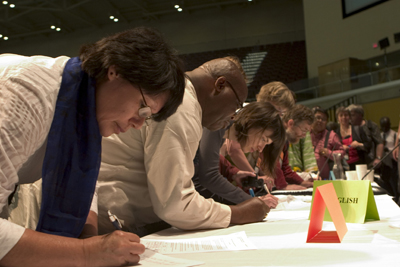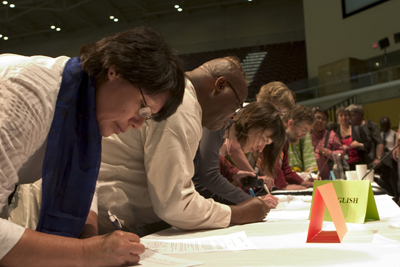
(RNS2-AUG12) Delegates from around the world sign in at the recent World Communion of Reformed Churches meeting in Grand Rapids, Mich., where 74 delegates were denied visas to attend. For use with RNS-RELIGION-VISAS, transmitted Aug. 12, 2010. RNS photo courtesy Erick Coll/UGC.

(RNS2-AUG12) Delegates from around the world sign in at the recent World Communion of Reformed Churches meeting in Grand Rapids, Mich., where 74 delegates were denied visas to attend. For use with RNS-RELIGION-VISAS, transmitted Aug. 12, 2010. RNS photo courtesy Erick Coll/UGC.
WASHINGTON (RNS) When the Baptist World Alliance held its global conference in Hawaii earlier this month, it was missing about 1,000 attendees from around the world.
In June, the inaugural meeting of the World Communion of Reformed Churches in Grand Rapids, Mich., was missing 74, and the Seventh-day Adventists’ General Conference in Atlanta was missing about 200.
The three church groups said foreign delegates’ visas were denied by U.S. officials, meaning some nations lacked representation at the global assemblies that occur only once every several years.
“I was deeply saddened” by the visa problems, said the Rev. Clifton Kirkpatrick, the former president of the World Alliance of Reformed Churches, which merged with another group in Grand Rapids to form the World Communion of Reformed Churches.
“I don’t think you hear of government events or corporate events that have this percentage of people denied visas.”
A lot of it had to do with money, he believes, saying “the criteria (for securing visas) are so skewed to the financial status of people involved.”
Church officials say they fully complied with State Department rules on international visas for visiting delegates — particularly providing evidencevisitors would return to their country of origin once the meetings ended.
“We registered our session with the U.S. State Department, and they put it on their internal intranet site,” said Rosa Banks, associate secretary of the Adventists’ General Conference. “And we updated it on a weekly basis when we got into the process.”
Like the Reformed gathering, Adventists said they found many of the rejected visas came from poverty-stricken areas of the world.
“The countries where we had the most problems were in West Africa, particularly Nigeria, and districts in India,” said Banks. “We have to assure that our delegates are going to return.”
Church leaders weren’t quiet about their anger.
“As a citizen of this country, I am outraged that United States consulates have refused access to an international ecumenical gathering because they feared terrorism and illegal immigration,” the Rev. Susan Davies of the United Church of Christ told the meeting.
In an Aug. 3 letter to Secretary of State Hillary Clinton and other officials, the Reformed leaders said “the decisions (to grant or deny visas) seem arbitrary.”
The letter acknowledged concerns about illegal immigration, subversive activities and the need to present evidence of funding while in the U.S.
“What we do not understand, and cannot accept,” the letter said, “is the fact that the 74 who were denied visas provided evidence that should have convinced the U.S. consuls in all these areas.”
A State Department spokeswoman said the U.S. holds a high standard when considering visa applicants that, unfortunately, often leads to denials for those who cannot provide sufficient evidence of returning to their homeland.
“It’s not about the conference, it’s about the applicant. And each one has to demonstrate that they qualify for the visa in accordance with the law,” said Rosemary Macray, spokeswoman for the Bureau of Consular Affairs with the State Department.
Applicants must show “a wealth of information and need to show strong ties to their home country and convince the adjudicating officer beyond a shadow of a doubt that they will return to their home country after their stay in the U.S.” she said.
Ongoing visa problems, however, could prompt some leaders to rethink holding future conferences in the U.S.
“We are getting into a position where it’s difficult to host major international ecumenical events in the U.S. with integrity,” Kirkpatrick said.
It also provides an image to the world that the U.S. is “not a welcoming country,” the letter to Clinton said.
“Our letter to you is not only a complaint,” the letter said. “It is a call for action.”




